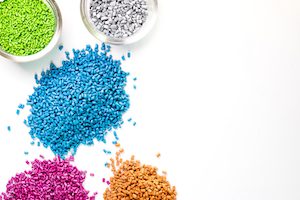
Thermoplastic polyurethane (TPU) is an elastomer that is fully thermoplastic. Like all thermoplastic elastomers, TPU is elastic and melt-processable. Further, it can be processed on extrusion as well as injection, blow and compression molding equipment. It can be vacuum-formed or solution-coated and is well suited for a wide variety of fabrication methodologies. TPU can even be colored through a number of processes. But more so than any other thermoplastic elastomer, TPU can provide a considerable number of physical property combinations making it an extremely flexible material adaptable to dozens of uses.
This is partly because TPU is a linear segmented block copolymer composed of hard and soft segments. The hard segment can be either aromatic or aliphatic. Aromatic TPU’s are based on isocyanates such as MDI while aliphatic TPU’s are based on isocyanates like H12 MDI. When these isocyanates are combined with short-chain diols, they become the hard block. Normally it is aromatic, but when color and clarity retention in sunlight exposure is a priority, an aliphatic hard segment is often used.
The soft segment can either be a polyether or polyester type, depending on the application. For example, wet environments generally require a polyether-based TPU while oil and hydrocarbon resistance often demand a polyester-based TPU. For even greater utility, the molecular weight, ratio and chemical type of the hard and soft segments can be varied.
This versatility results from the unique structure of TPU that results in high resilience, good compression set, plus resistance to impacts, abrasions, tears, weather, and even hydrocarbons. TPU offers flexibility without the use of plasticizers as well as a broad range of hardness’s and high elasticity. In fact, TPU bridges the material gap between rubbers and plastics. Its range of physical properties enables TPU to be used as both a hard rubber and a soft engineering thermoplastic. TPU’s can be sterilized, welded, easily processed, colored, painted, printed, die-cut and slitted. They have low temperature flexibility and, in some grades, exhibit biocompatibility, hydrolytic stability, optical clarity, plus flame retardant and anti-static properties.
TPU Compounds
Further, TPU can be compounded for use in numerous applications where greater structural integrity is required, such as for automotive body side moldings. For example, when mixed with glass fiber or mineral fillers, TPU’s properties of abrasion resistance, paintability, high impact strength and good low temperature flexibility can all become enhanced, and the compound also demonstrates good fuel and oil resistance and high melt flow characteristics.
In addition, TPU is an outstanding contributor of polymer blends. When added to polyvinyl chloride (PVC), TPU improves compression set, abrasion resistance and low temperature flexibility.
When added to polycarbonate or acrylonitrile-butadiene-styrene (ABS), a TPU resin with a nominal flexural modulus of 18,000, produces compounds with flexural modulus values up to 150,000 psi. In this way, specialized compounds can be made that improve the properties of polycarbonate or ABS or other plastics.
TPU Applications
These properties make TPU extremely useful for hundreds of products:
Whether for its outstanding toughness, durability or processing ease, TPU is a versatile performer that bridges the gap between rubber and plastics.